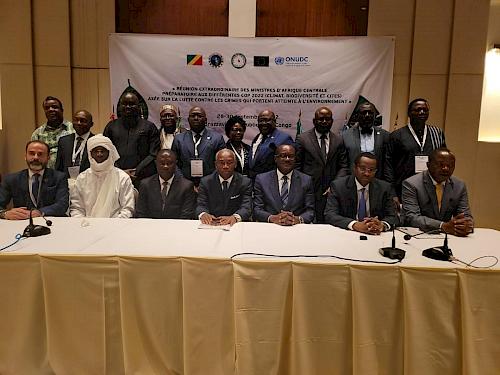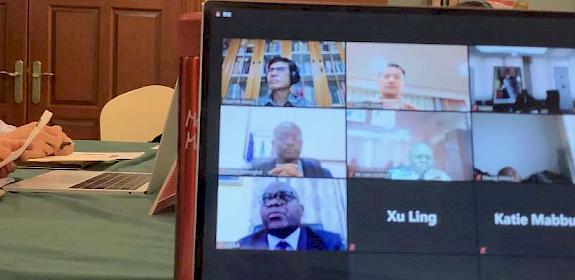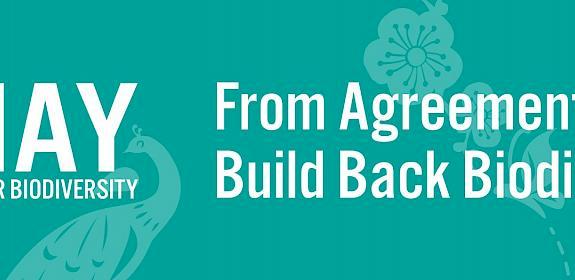New plan of action to combat illegal wildlife trade in Central Africa
To realign efforts to combat the latest trends in wildlife crime, countries of the Central Africa Forest Commission (COMIFAC) have adopted the second wildlife law enforcement action plan, known as PAPECALF (from a previous French acronym).
The end of 2022 will be a critical period for environmental policy, with a number of upcoming, high-priority Conferences – the Conventions on biodiversity (CBD1), climate change (UNFCCC2) and wildlife trade (CITES3). Therefore, it is critical for Ministers and experts to come together and discuss common positions and the fight against environmental crimes.
To this end, Jules Doret Ndongo, the Cameroonian Minister of Forestry and Wildlife and Chair of COMIFAC, convened a meeting in Kintélé in the Republic of the Congo on 28-30 September 2022, bringing together COMIFAC Ministers, as well as technical and financial partners. Among other items included in the agenda was the discussion for the adoption of PAPECALF Phase Two document.
PAPECALF Phase Two, in place until 2025, will have the same objectives as the former plan: |
|---|
|
PAPECALF Phase Two marks a new era in the fight against IWT in central Africa and will serve as the prime policy reference for our common intervention in the battle against wildlife trafficking cartels.”
Denis Mahonghol, the Programme Office Director, TRAFFIC Central Africa
The meeting was chaired by the Prime Minister of the Republic of the Congo, His Excellency Anicet Collinet Makosso, with the financial support of the ECCAS Commission, EU via the ECOFAC VI programme and UNODC.
By considering the latest data on wildlife trafficking trends, the scope of PAPECALF Phase Two has been realigned to safeguard the most at-risk species. Phase One saw great success through increased arrests, seizures, and prosecutions of traffickers and creating momentum for change among stakeholders. Where it had a strong emphasis on targeting elephant poaching and ivory trafficking (as a direct response to the massacre of 300 African Elephants in Bouba Ndjida National Park, Cameroon, in 2012), the new plan is more inclusive of other fauna, tied to trends that have emerged since Phase One, such as trafficking of pangolins and other bushmeat species.
The new plan also recognises that working with indigenous people and local communities, as well as factoring in the gender dynamics of wildlife trade, are also conditions for the plan’s success.
TRAFFIC, who was in attendance, have the expertise and tools to assist in the execution of the new plan: “We will continue to support the implementation of PAPECALF 2 through some of its major initiatives like AFRICA-TWIX (Trade in Wildlife Information eXchange) and SYVBAC, the Central Africa bushmeat monitoring system developed by TRAFFIC for COMIFAC countries,” said Denis Mahonghol.

Notes:
1 Convention on Biological Diversity
2 United Nations Framework Convention on Climate Change
3 Convention on International Trade in Endangered Species of Wild Fauna and Flora
Countries represented at the event included:
Angola, Burundi, Cameroon, Central African Republic, Gabon, Republic of the Congo, Democratic Republic of Congo, Chad.
The following international and regional organisations also took part: the Economic Commission for Central African States (ECCAS) Secretariat, European Union (EU), International Tropical Timber Organization (ITTO), United Nations Office on Drugs and Crime (UNODC), the German facilitation of the Congo Basin Forest Partnership (CBFP), Organisation for the Conservation of Wildlife in Africa (known as OCFSA), INTERPOL, Network of Civil Society Organisations for the Green Economy in Central Africa (known as ROSCEVAC), and TRAFFIC.
Acknowledgement
PAPECALF 2 was developed thanks to WWF France and the German cooperation agency (GIZ) support through the DETER project on "Demand reduction, Enforcement and policies supporting the conservation of Elephants and Rhinos" implemented on behalf of the German Federal Ministry for Economic Cooperation and Development (BMZ), the German Federal Ministry for the Environment, Nature Conservation and Nuclear Safety (BMU).




